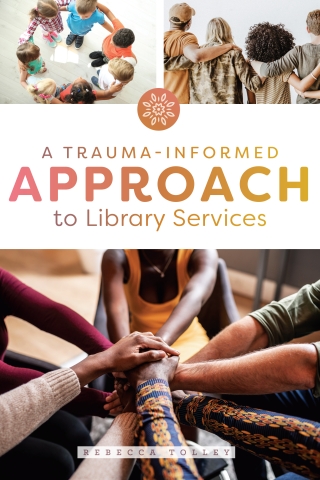The Trauma-informed Library Worker
a guest post by Rebecca Tolley
You’re a trauma-informed library worker and maybe your organization is trauma-responsive, meaning they’re dedicated to examining culture, behavior, and services (including scrutinizing and refining policies, procedures, and processes). Many library administrations consider trauma-informed approaches in a positive light, but few have resources to invest in both short-term and long-term commitment and accountability that being trauma-responsive requires.

As library workers we recognize how valuable our work is with our communities, and while initial steps in becoming trauma-informed focus on identifying trauma responses in behaviors and expressing empathy toward the triggered, an additional objective we can consider is the idea of post-traumatic growth and what roles library workers and their organizations may play in that.
It’s likely that your library collections, materials, spaces, and programming are inadvertently helping people grow from their trauma. When we plan with intention then our deliberateness and care in crafting professional priorities, goals, and objectives allows us to align our resources and efforts with post-traumatic growth values.
Those visiting our libraries use our collections, spaces, and other resources, thus helping them process their experiences. The more diverse our offerings are the more likely our communities gain new perspectives and build resilience, thus smoothing transitions allowing them to grow beyond trauma.
Providing curated access to information relevant to trauma recovery guides people to self-help books, memoirs, biographies of resilient people, and educational materials on specific types of experiences like generational and community trauma. Our spaces historically provided sanctuary for all and leveraging that point in your communications reminds all that there are quiet and supportive spaces in our libraries.
Further, we can build community by hosting support groups or programs designed for trauma survivors. Healing happens in relationship with others, especially those who understand traumatic experiences. Peer support is a key principle of the trauma informed framework, so creating affinity groups within your communities is an intentional way to facilitate post-traumatic growth.
Establishing book groups that explore literature and/or memoirs with themes relevant for trauma survivors are excellent containers for safe and brave spaces within which resilience and growth flourish. While people at your library may not be equipped to facilitate these reading experiences, partnering with local mental health providers to lead intentional events lets survivors share their stories, connect, and build their networks.
These kinds of intentional post-traumatic growth strategies can stem the tide of our rising public health crisis of loneliness and isolation, and this aligns with pillar 6 of our national strategy to advance social connection: Cultivate a culture of connection. The US Surgeon General encourages Americans to feel the healing effects of social connection and community. Trauma-informed library workers like you have an important role to play.
Learn more at the ALA Store.
